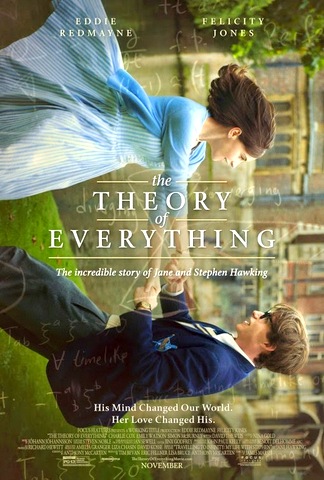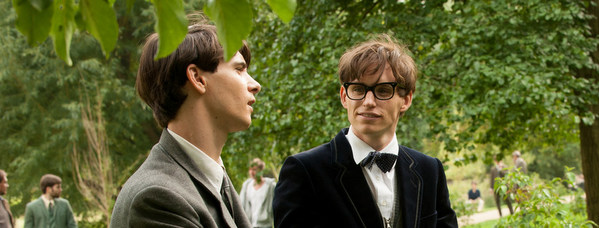REVIEW: The Theory of Everything | Released 7 November 2014 | Directed by James Marsh | Starring Eddie Redmayne, Felicity Jones, Charlie Cox, Emily Watson, Simon McBurney, David Thewlis | [usr 3]
Here is the sad and frustrating irony of “The Theory of Everything”: it’s a biopic about one of the most brilliant people in the history of the planet, the renowned astrophysicist Stephen Hawking – a man famous for thinking in boldly innovative ways – yet his story is told in the safest and most conventional method imaginable.
This is ironic given the director: James Marsh, an Academy Award winner for the 2008 documentary “Man on Wire,” which was so thrilling and so clever in its narrative structure that it made you leave the theater feeling as if you’d actually witnessed Philippe Petit walking across a tightrope between the World Trade Center Towers. (You didn’t – the film features photographs and reenactments but no film footage of Petit pulling off his daredevil stunt. That’s how persuasive Marsh can be.)
Here, he’s made a strongly acted, handsomely crafted film that nonetheless feels bland and unsatisfying. It falls into the trap that so many biopics do: It hits all the key moments in the life of the author of “A Brief History of Time” and skims the surface of a complicated existence without digging deeper, without taking chances. Everyone involved does everything they should, and the result is just sort of … fine.
 Of course, Hawking’s story is inspiring – the way he’s battled motor neuron disease over the past 50 years and defied the odds not only to survive, but thrive. And in playing Hawking, Eddie Redmayne more than rises to the challenge of portraying the man’s gradual physical deterioration but also conveying the spark of mental acuity that has remained, and marked all of Hawking’s important work. Nothing the 32-year-old actor has done previously (“Les Miserables,” “My Week With Marilyn”) suggested he had this sort of complexity in him. It’s an impressive performance, so much so that it makes you wish it were in the service of stronger material.
Of course, Hawking’s story is inspiring – the way he’s battled motor neuron disease over the past 50 years and defied the odds not only to survive, but thrive. And in playing Hawking, Eddie Redmayne more than rises to the challenge of portraying the man’s gradual physical deterioration but also conveying the spark of mental acuity that has remained, and marked all of Hawking’s important work. Nothing the 32-year-old actor has done previously (“Les Miserables,” “My Week With Marilyn”) suggested he had this sort of complexity in him. It’s an impressive performance, so much so that it makes you wish it were in the service of stronger material.
“The Theory of Everything” comes from screenwriter Anthony McCarten, based on “Travelling to Infinity: My Life With Stephen,” the memoir by Hawking’s first wife, Jane. A general feeling of tastefulness permeates the proceedings, as if everyone wanted to be overly respectful toward these people, and their life, and the access they provided, at the expense of revelations that might have seemed inappropriate or startling or, heaven forbid, thought-provoking.
The love and support we see from Jane Hawking are tireless; as portrayed by a fresh-faced Felicity Jones, Jane is a woman of both grace and strength. And what she went through in taking care of him while raising their three children and trying to focus on her own intellectual pursuits must have been exhausting, and often discouraging. It must have threatened to swallow her whole. We see very little of that here. This Jane is a saint.
But the early scenes between Redmayne and Jones positively crackle. There’s an instant connection when they spy each other across a crowded room at a party at Cambridge in 1963. He’s fumbling and funny, she’s pretty and perky. He’s studying cosmology, she’s studying medieval Spanish poetry. He’s an atheist, she’s a devout follower of the Church of England. But they’re mutually curious and seem to bring out the best in one another. Their preliminary days include a romantic scene involving the little-known properties of Tide laundry detergent.
Everything seems possible for these two young and brilliant minds, until Hawking experiences a series of increasingly clumsy moments, followed by a serious spill on the campus courtyard. Then comes the diagnosis at age 21 that he has motor neuron disease, or ALS, better known as Lou Gehrig’s disease. The doctor also gives him just two years to live. Hawking tries to withdraw but Jane won’t have it; she forces her way into his life and insists she’s ready for whatever comes their way. They quickly marry, and eventually have three children.
But as Stephen’s body weakens and the family has to make continual adjustments to his physical status – including the famous computerized voice he creates when he no longer can speak, which is the source of some of the film’s precious few laughs – his mind stays sharp. He continues his pursuit of the one simple, elegant equation that will explain everything in the universe. (And it should be noted that “The Theory of Everything” is one of three films opening this week in which black holes figure prominently, alongside “Interstellar” and “Big Hero 6.”) Not unlike our own dear Roger Ebert, Hawking’s mind became even more expansive and powerful once he began losing his physical abilities.
Eventually, “The Theory of Everything” reaches a point where it toys with a challenging notion: the possibility that Jane and Hawking each had dalliances on the side with the other’s tacit approval, once it became clear that their marriage had changed irreparably. Jane sought solace with Jonathan Hellyer Jones (Charlie Cox), the hunky, widowed choir director with big, brown puppy-dog eyes who served as Hawking’s caretaker, and the family’s de facto husband and father figure. Hawking later had the pleasure of spending time with the beautiful and vibrant therapist Elaine (a charismatic Maxine Peake), who flirted with Stephen and even leafed through the pages of a Penthouse magazine for his perusal.
But the film glosses over these extra-marital relationships and their resolution with little muss, fuss, or emotional distress. It tiptoes toward the fire and then scurries back. It’s unfortunately an apt metaphor for the film as a whole.
Culled from Roger Ebert





